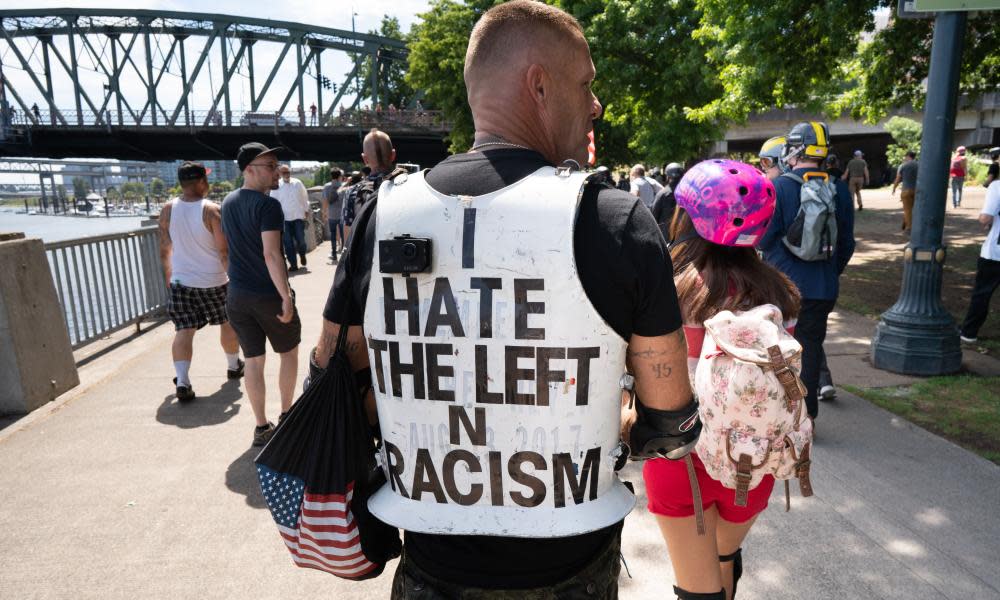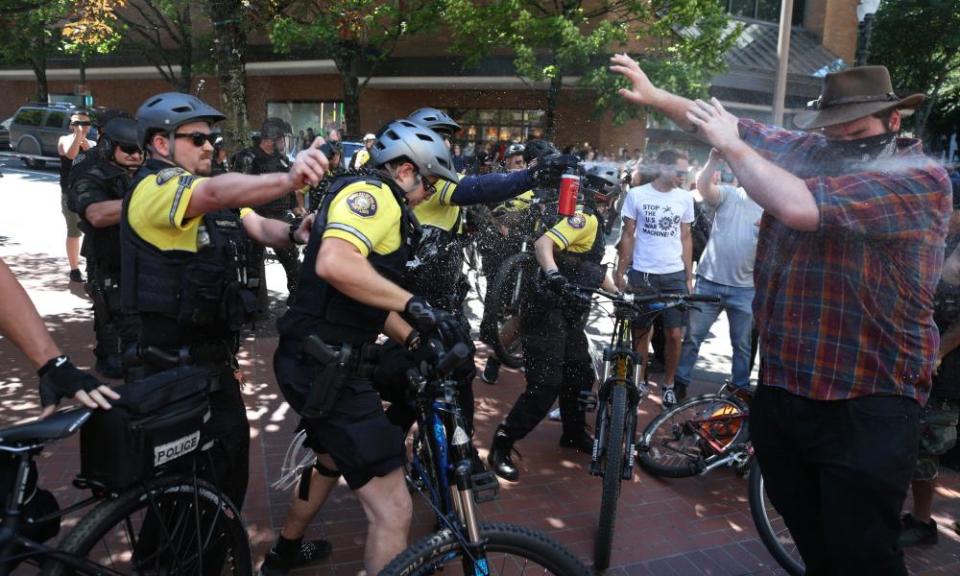How Portland's liberal utopia became the center of a rightwing war in the US

During the Obama years, Portland was widely seen as a redoubt of crunchy, progressive, west coast liberalism. Much of the world saw the city through the lens of Portlandia, a TV sketch show that lampooned hipsters, cyclists and fussy diners. The city was viewed as a liberal, cultural centre of the US – and a sharp contrast with more traditional conservative parts of the country. Its laid-back image was frequently satirised, not least by the comedian Fred Armisen, who said: “It’s where young people go to retire.”
Portlandia was more a caricature than a portrait, and locals noted what it left out – rapid gentrification and displacement, increasing homelessness, the contentious policing of the Portland police bureau (PPB) and the long racist history in the Pacific north-west that made Portland the whitest major city in America. The former NBA player Greg Oden said of his time playing in Portland: “It isn’t a great city to live in if you’re a young African American male with a lot of money.”
Related: How white supremacy went mainstream in the US: 8chan, Trump, voter suppression
Even as Portlandia’s run was ending, a darker picture of the city was being painted, often by outsiders.
This weekend will see the latest in a long line of far-right gatherings that have plagued the city over the last few years. Various groups, including the most visible, the Proud Boys, will descend on the downtown area. Once again they will be met by leftist counter-protesters. And once again, PPB will be under heavy scrutiny for the way in which they police the event.
But how did Portland, for so long considered a bastion of American liberalism, become the centre of the country’s battle between left and right?
Ask Portland’s mayor, Ted Wheeler, what happened to the city’s brewpubs-and-bikes image, and he will say that behind the headlines and images of political street fighting, that city still exists.
“I would say Portland has not changed. The impression that people get these days is that everywhere you go in Portland violence is breaking out all over the place. That couldn’t be further from the truth.”
Since the 2016 election, the national spotlight has frequently been on Portland during bouts of political violence: a double murder linked to white supremacy in 2017, riots downtown pitting far-right groups against anti-fascists, and instances of heavy-handed policing which have left city residents bloodied and traumatized.
Portland, like most west coast cities, is deeply Democratic in its politics, and it has long been home to more radical left currents. And the Portlandia image has some basis in truth – the city has developed a diverse service economy notable for its craft breweries, cafes, restaurants and artisanal goods.
But the Oregon hinterland is deeply conservative, and Portland itself has long been a target for far-right organising. In the 1980s and 1990s, neo-Nazi skinheads converged in the streets, and a gang killed an Ethiopian immigrant, Mulugeta Seraw, in 1988.

A number of far-right groups have placed themselves at the center of more recent events. One, Patriot Prayer, is led by Joey Gibson, who lives across the Columbia river in Vancouver, Washington. Gibson has organized about 18 rallies in Portland since 2017, some of which have degenerated into violence.
On Thursday, Gibson became the fifth person arrested in just over a week as a result of a raid in May on Cider Riot, a bar popular with the left. He was charged with rioting, a felony.
Last July, Gibson told conspiracy broadcaster Alex Jones: “Portland is one of the worst cities in this country. It’s full of so much darkness. That’s why I’m so motivated to go there.”
Every event Gibson has organised in Portland has been met by a counter-protest, and these have generally been far larger than the rightwing crowds. Opposition to the rallies acquired a new impetus in May 2017, after Jeremy Christian allegedly showered passengers on a commuter train with racial abuse, and then allegedly stabbed three men who came to their aid, killing two. Christian, who has been charged with aggravated murder, had attended a “free speech” rally organized by Gibson the previous month draped in an American flag and making fascist salutes.

Local anti-fascist groups, especially Rose City Antifa, have produced photographic evidence that early on Gibson’s rallies were attracting local extremists from white nationalist groups.
But it is another group which has become increasingly central to Portland’s rightwing protests: the Proud Boys. The “western chauvinist” fraternity, established by the Vice co-founder Gavin McInnes in 2015, has been involved in street violence throughout the US. Trials are ongoing after an incident in New York City last year where 10 members of the group were caught on video beating anti-fascists at the conclusion of a McInnes speech.
The group has been particularly active in the Pacific north-west. They first cooperated with Gibson in the events he organized, until a reported split. Men in Proud Boys colours were closely involved in one of the worst incidents of political street violence in Portland’s recent history, in June last year.
This weekend, the Proud Boys are front and center again. The main organizer is Joe Biggs, a combat veteran and former Alex Jones employee who prominently displays the Proud Boys logo on his Facebook page.
Biggs has been banned from many platforms after issuing threats ahead of the rally. In a Periscope video, he warned anti-fascists, or “antifa”: “Every time you turn your shoulder or your head, you look over, you’re always gonna feel like myself or someone else is gonna be there looking, because that’s what we’re going to do.”
Wheeler, the mayor, laid some of the blame for this far-right resurgence at the feet of Donald Trump.
“What’s happening on the streets of Portland, or what’s happening on the streets of any other community in this country, is not removed from the national trend that we’re seeing,” Wheeler said. “One has to acknowledge that our president has given life to that kind of hostility, that kind of hate speech.”
But the right seems not to hear it. In recent weeks, the Texas senator Ted Cruz has sparred with Mayor Wheeler on Twitter, and called for federal investigation into the city’s handling of protests.
Amid rising white nationalism, Cruz has also proposed a Senate resolution which would designate antifa as a domestic terrorist group. The resolution describes Rose City Antifa as a group that “explicitly rejects the authority of law enforcement officers in the United States”.

Harmeet Dhillon, a former editor of the conservative Dartmouth Review, a sometimes lawyer for fired Google engineer James Damore, and the Republican National Committeewoman for California, is promising to sue the city on behalf of Andy Ngo, a conservative writer who was milkshaked and punched by masked protesters at a protest in the city on 29 June.
Ngo’s assault initiated a firestorm of outrage in conservative media on its way to becoming a global story. It even attracted the attention of Trump, who mentioned Ngo by name in a speech to a social media summit packed with rightwing internet personalities. Trump also tweeted support of a terrorist designation for antifa.
Zakir Khan, the program manager at the Portland-based progressive not-for-profit the Western States Center, said that the Democratic leadership, including Wheeler, have given rightwing groups an opening.
“I think that one of the things that these groups look for is vulnerabilities in leadership,” he said. “And when these incursions from far-right groups started happening, we didn’t see a city, a county, a state-wide response.”
Wheeler, for his part, said it’s not just his or Portland’s problem. “For me, it is so clear that what’s at stake here goes well beyond the question of public safety in one municipality in the United States,” he said.
Like California and Washington, Oregon’s politics are dominated by the larger urban centers in the western half of the state.
In rural communities – many of which have experienced decades of economic decline – this breeds resentment. This us-versus-them politics “allows the possibility that the far right in cities like Portland can begin linking themselves with rural articulations, like the Three Percenters or the Oath Keepers”, says Joe Lowndes, who teaches political science at the University of Oregon.
Related: 'Senseless hate': the far right's deep roots in southern California
During the period where the city has become a symbol for the right, PPB has not appeared to develop a consistent policy for policing events.
At two consecutive waterfront protests in 2017, brawls were allowed to go on throughout the late afternoon, with apparently little intervention from police, and no arrests.
This has led to accusations from the left of a bias towards rightwing groups. On the right, the persistent rumor has been that Wheeler has ordered the police to stand down. Media reports, however, have suggested that police sympathies flow mostly in one direction.
Emails and texts uncovered in February suggested a warm relationship between Gibson and a PPB lieutenant who commanded the squad that patrols city protests. The Guardian reported on a video which appeared to show PPB officers cutting deals with Gibson on a lieutenant’s instructions. Earlier, a PPB report described far-right protesters as “much more mainstream” than their leftwing antagonists.
On Wednesday, Mayor Wheeler convened a large coalition of community groups and leaders. He announced earlier that they would “come together as one to denounce violence” in the city’s main downtown square.
“We will definitely have the personnel and the resources deployed in the field,” he said, “with the goals of preventing violence, and vandalism, and deescalating any potential flashpoints as they arise.”
Portlanders – and the world – will be wondering if that will be enough.

